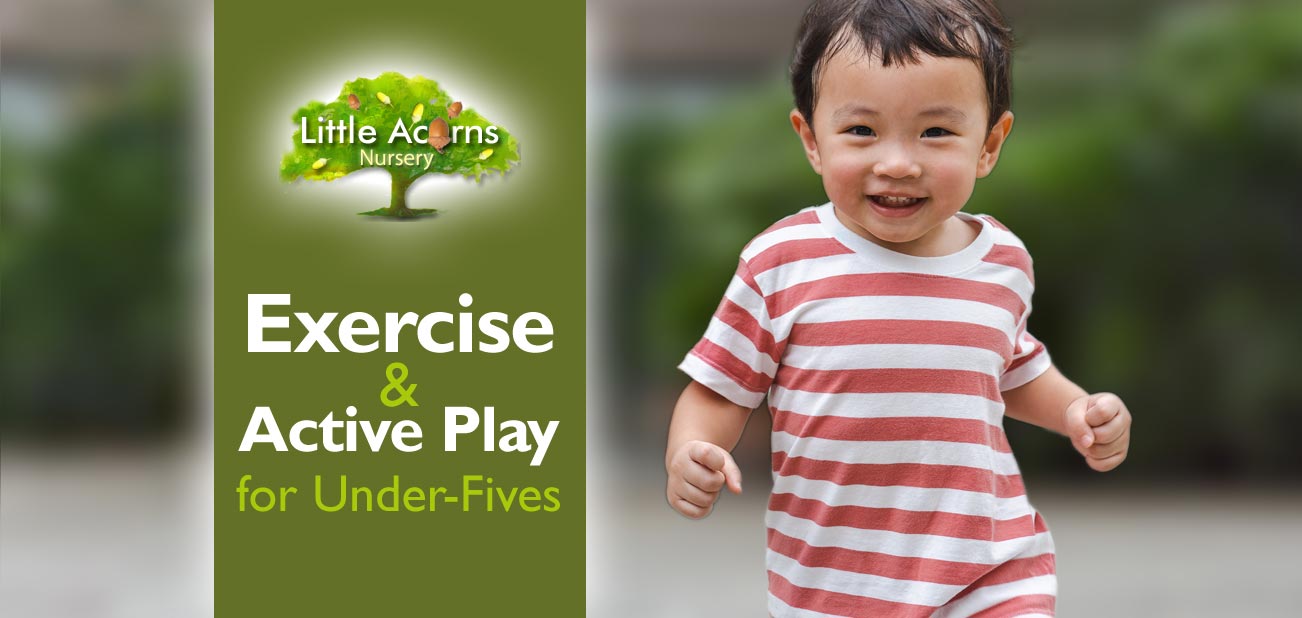
A healthy lifestyle is crucially important for health and wellbeing at any age, but it’s even more important in the early years. At this age, children are still at a critical time in their physical and mental development. We wrote last month about the need for healthy eating for toddlers and preschoolers and now follow this up by exploring the importance of exercise and active play for under fives.
The Importance of Exercise for Under-Fives
 Generally speaking, under-fives should be encouraged to be active. There are many benefits of this including remaining physically fit, getting to know and enhancing physical abilities, honing motor skills (fine and gross) and improving coordination and balance. In addition, it helps the very young to develop visual and sensory skills. Physical activity is also part and parcel of the development of new neurological pathways in the brain. All these skills and benefits will become increasingly important as children grow, develop and become ever-more active and independent.
Generally speaking, under-fives should be encouraged to be active. There are many benefits of this including remaining physically fit, getting to know and enhancing physical abilities, honing motor skills (fine and gross) and improving coordination and balance. In addition, it helps the very young to develop visual and sensory skills. Physical activity is also part and parcel of the development of new neurological pathways in the brain. All these skills and benefits will become increasingly important as children grow, develop and become ever-more active and independent.
Exercise for Babies — Tummy Time
Exercise for babies comes in the form of light, active play. At this early age, even starting as newborns, they can begin via floor activities known commonly as Tummy Time. Here, the supervising adult places them on their stomach on a suitably comfy, safe and soft area of the floor and encourages them to move their head, arms and legs.
Close supervision is essential for your baby’s safety and, of course, the baby must always be awake when they’re in this ‘prone’ position
Allowing babies to move on their tummies will help to strengthen limbs, neck, shoulder and back muscles and also help the infant to develop their motor, coordination and visual skills. It’s also believed to help babies avoid ‘positional conditions’, including the development of skull deformations and neck problems. As we mentioned before, it even helps babies’ brains to form new neural pathways.
Tummy time should last only 3 to 5 minutes when they first start as young babies, with the infants attempting it only 2 to 3 times over the course of each day initially. As they grow towards the age of 12 months, this can be slowly increased to suit the baby’s increasing strength and physical abilities. Eventually, the baby will be able to roll over sideways in both directions, be able to sit and self-direct — and may indeed be crawling by the time they’re around 7 to 9 months of age.
Exercise for Toddlers
By the time they are toddlers (1-2 years old), they will usually have mastered all of the above and be adept at self-directing, grasping, pulling, pushing and moving around unaided. Indeed, toddlers should now be active each day for around 3 hours in total (split across a few sessions). Now they’re this age, toddlers’ active play and exercise can include light activities such as standing up, playing actively, rolling and moving around. It should also include more energetic activities (safely – so supervision and a safe environment are needed) like running, hopping, skipping and jumping. Activities like ball games are also great at this age, as are use of appropriate climbing frames and even riding tricycles if they’re able to do so safely.
Exercise for Preschoolers
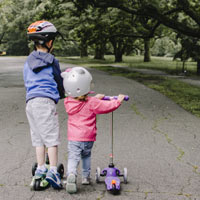 Once they reach the age of 3 to 4 (preschoolers), 3 hours of physical activity is an ideal daily minimum. Now that they’re older and more confident in their physical skills, they can continue with the toddler activities but add more complex and moderately vigorous options to their play. Dancing, swimming, scooting, climbing, chasing, cycling and energetic outdoor activities are good examples.
Once they reach the age of 3 to 4 (preschoolers), 3 hours of physical activity is an ideal daily minimum. Now that they’re older and more confident in their physical skills, they can continue with the toddler activities but add more complex and moderately vigorous options to their play. Dancing, swimming, scooting, climbing, chasing, cycling and energetic outdoor activities are good examples.
Avoiding Too Much Inactivity (… & TV!)
What’s equally important is to avoid letting children remain inactive for long periods of time. Hours each day spent in front of screens like tablets, mobiles, games consoles and TVs is not good for them. Moreover, doing so for long periods when they’re at such formative ages sets up a dangerous pattern of behaviour that might be hard to break. It could also lead to health and wellbeing issues like becoming overweight or even obese. In fact, a staggering 20% of children are overweight or obese before they even start school, according to NHS data. What’s more, they say that 9 out of 10 children aged between two and four are not doing sufficient levels of physical activity to meet recommendations from the UK’s Chief Medical Officers. Worrying statistics!
Exercise & Active Play at Little Acorns Nursery, Chorley
Babies, toddlers and preschoolers learn through play at Little Acorns Nursery. This means that physical activity comes naturally, forming a key part in keeping children active and adequately exercised as they develop. Indeed, it’s all embedded as part of the nursery’s EYFS curriculum, particularly in the Physical Development module. As such, children use the huge variety of physical activities on offer at the nursery to improve mobility, coordination, balance, physical fitness, hand-eye coordination, agility, physical strength and so on. This is all done through a learning and development plan that’s tailored to the strengths, weaknesses and preferences of each individual child. The Key Person is a member of staff assigned to oversee the progress of each child and goals are set and milestones recorded. In this way, every child will achieve personal bests during their time with Little Acorns, becoming well-rounded, ‘school-ready’ individuals by the time they’re five.
Nursery Places Available in Clayton-le-Woods, Chorley
 We sometimes have a few places available at our nursery in Clayton-le-Woods, near Clayton Green and Clayton Brook, Chorley. Do get in touch if you’d potentially like a place for your son or daughter. As well as being the outright winner of a stunning National award, it’s one of only a few Lancashire nurseries recognised by Ofsted as Outstanding and is also a Forest School. This allows your child to also enjoy and learn from everything that nature and the outdoors have to offer. Register with us if you are interested, or contact us while nursery places are available — we’d love to hear from you. See the following options:
We sometimes have a few places available at our nursery in Clayton-le-Woods, near Clayton Green and Clayton Brook, Chorley. Do get in touch if you’d potentially like a place for your son or daughter. As well as being the outright winner of a stunning National award, it’s one of only a few Lancashire nurseries recognised by Ofsted as Outstanding and is also a Forest School. This allows your child to also enjoy and learn from everything that nature and the outdoors have to offer. Register with us if you are interested, or contact us while nursery places are available — we’d love to hear from you. See the following options:

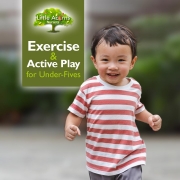
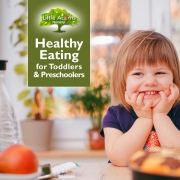
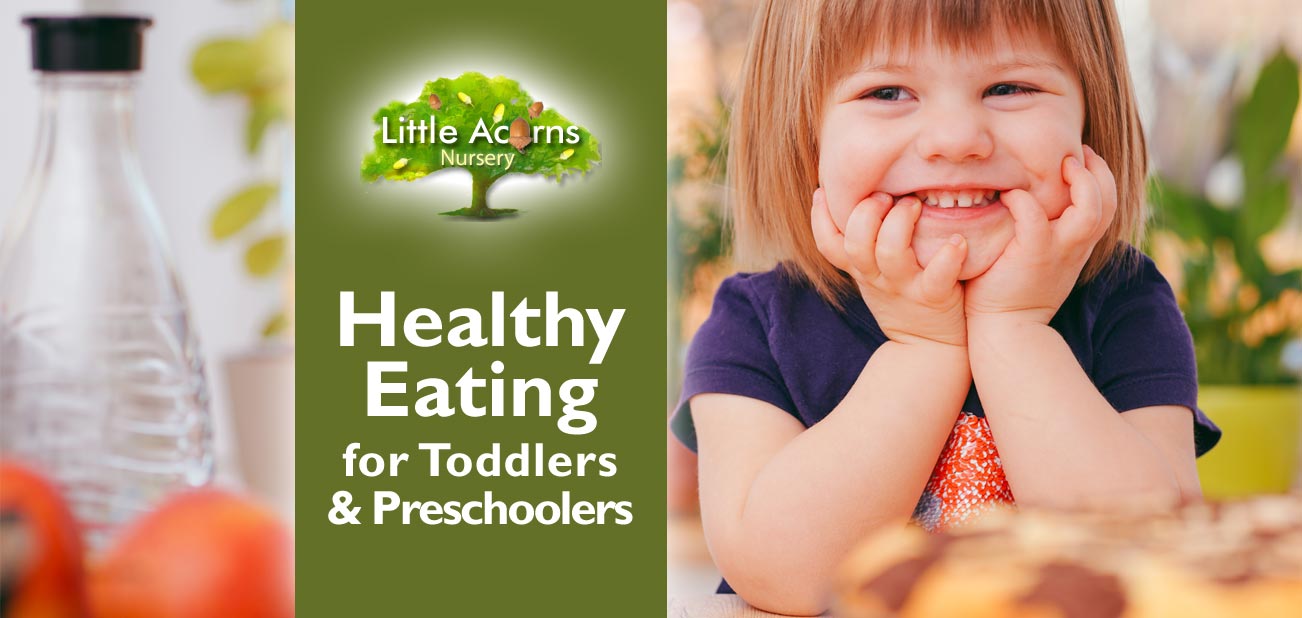
 Eating a healthy, balanced diet is important at any age. However, during their formative years when they’re still growing, it’s even more important for under-fives. Their young bodies and brains are still developing, so getting the right balance of food types, vitamins and nutrients is essential in order to maintain optimum health, cognitive function and even sufficient energy levels. (Regular exercise is also essential, of course – however, we’ll cover that separately in a future post).
Eating a healthy, balanced diet is important at any age. However, during their formative years when they’re still growing, it’s even more important for under-fives. Their young bodies and brains are still developing, so getting the right balance of food types, vitamins and nutrients is essential in order to maintain optimum health, cognitive function and even sufficient energy levels. (Regular exercise is also essential, of course – however, we’ll cover that separately in a future post).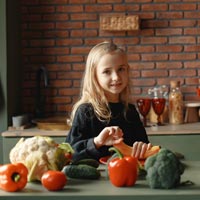 That’s a huge and important list of benefits. Advice from Public Health England also suggests that exposing children to a wide variety of different foods from an early age not only gives them access to greater diversity in what they eat, but is also likely to make children more accepting of new foods as they grow older. And, of course, that greater diversity in food types means a more diverse range of nutrients, vitamins and minerals will be consumed.
That’s a huge and important list of benefits. Advice from Public Health England also suggests that exposing children to a wide variety of different foods from an early age not only gives them access to greater diversity in what they eat, but is also likely to make children more accepting of new foods as they grow older. And, of course, that greater diversity in food types means a more diverse range of nutrients, vitamins and minerals will be consumed.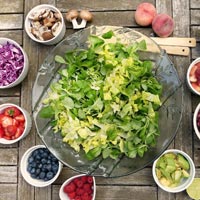 As part of a healthy diet, children should try to eat something from each of the four main food groups every day. These are:
As part of a healthy diet, children should try to eat something from each of the four main food groups every day. These are: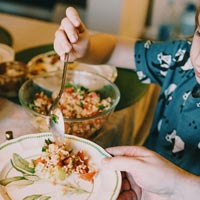 Dairy products, which give children much-needed calcium, Vitamins A and B, potassium and more. Aim for 3 portions of dairy products per day. Examples include milk, yoghurt and cheese. Use full-fat options for toddlers and then, from the age of 2, switch to semi-skimmed varieties.
Dairy products, which give children much-needed calcium, Vitamins A and B, potassium and more. Aim for 3 portions of dairy products per day. Examples include milk, yoghurt and cheese. Use full-fat options for toddlers and then, from the age of 2, switch to semi-skimmed varieties.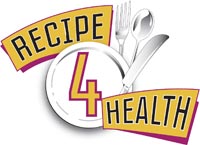 At Little Acorns we are serious about playing our part and serve up healthy, balanced meals each day to our children along with suitable drinks and healthy snack options. Breakfast, lunch, afternoon and teatime snacks are all provided and included in our standard nursery fees. Food is prepared each day by Judy, our wonderful in-house chef, using the highest quality, fresh ingredients, sourced from local suppliers. Food allergens are extremely carefully monitored and managed. Any special diets, e.g. vegan or vegetarian, are also catered for as needed — simply forewarn us about any specific requirements and we’ll be happy to accommodate them.
At Little Acorns we are serious about playing our part and serve up healthy, balanced meals each day to our children along with suitable drinks and healthy snack options. Breakfast, lunch, afternoon and teatime snacks are all provided and included in our standard nursery fees. Food is prepared each day by Judy, our wonderful in-house chef, using the highest quality, fresh ingredients, sourced from local suppliers. Food allergens are extremely carefully monitored and managed. Any special diets, e.g. vegan or vegetarian, are also catered for as needed — simply forewarn us about any specific requirements and we’ll be happy to accommodate them. Little Acorns Nursery has a
Little Acorns Nursery has a 